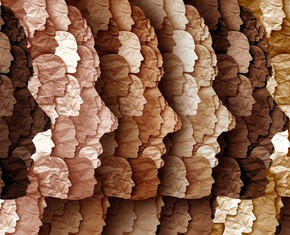The views expressed in our content reflect individual perspectives and do not represent the authoritative views of the Baha'i Faith.
When we think about justice, we often consider it in the context of our personal lives. We’ve all suffered injustice, so everyone naturally imagines how it could be replaced by actual justice.
An important distinction should be made at this point, however: justice is a little different in the context of the relationship of the individual with the state, as compared to the relationships between individuals.
Each state and nation has a duty to protect its citizenry, to adhere to the rule of law, and to ensure fairness and equity for all. No governmental entity has reached that pinnacle of fairness, but many try – some more than others – to attain it. This relationship of the individual to the state ideally bases itself on reciprocity. That is, the values of the individuals in a society are expressed in the laws of the society’s government. In exchange for the support of the citizens, the government enforces those values and laws.
RELATED: What Happens Next? Finding Justice Through Consultation
The Baha’i Faith defines justice as “giving each his due.” The Baha’i teachings say that justice is upheld by reward and punishment. The Baha’i writings also state that justice is a powerful force, a brilliant spiritual light, the cause of the appearance of unity, and the standard that brings order, peace and tranquility to the life of society. Baha’u’llah, the prophet and founder of the Baha’i Faith, wrote:
The structure of world stability and order hath been reared upon, and will continue to be sustained by, the twin pillars of reward and punishment. … Justice hath a mighty force at its command. It is none other than reward and punishment for the deeds of men. By the power of this force the tabernacle of order is established throughout the world, causing the wicked to restrain their natures for fear of punishment.
Just as justice must ideally define the relationship between a nation’s government and its citizenry, it must also define the relationship between the individuals of that society. In this regard justice creates order and fairness, but it also benefits every person because it provides to others what is morally right, does good to all we interact with, and expresses kind, loving, forbearing and generous actions.
Ultimately, the Baha’i teachings say, perfect justice involves seeing all humanity as one family, one race. In his book “The Secret of Divine Civilization,” Abdu’l-Baha, Baha’u’llah’s son and designated successor, defined this attribute of perfection as:
… justice and impartiality. This means to have no regard for one’s own personal benefits and selfish advantages, and to carry out the laws of God without the slightest concern for anything else. It means to see one’s self as only one of the servants of God, the All-Possessing, and except for aspiring to spiritual distinction, never attempting to be singled out from the others. It means to consider the welfare of the community as one’s own. It means, in brief, to regard humanity as a single individual, and one’s own self as a member of that corporeal form, and to know of a certainty that if pain or injury afflicts any member of that body, it must inevitably result in suffering for all the rest.
In this sense, justice embodies all qualities of moral virtue and goodness. Take honesty for example; if we are dishonest with someone, we have done them an injustice. If we are unkind, impatient, ungenerous, selfish, etc., we are acting unjustly. So, to be just means to act with moral rectitude – and if we are acting as such, we know we are being just to the best of our ability.
RELATED: Reaching Internal Goals and Avoiding Guilt
In summary, justice is an eternal spiritual reality. Its essence is beyond our ken and comprehension, but we can come closer to it by thoughtful study of God’s revelation. Baha’is believe that the creation of a just society is realistic and possible, if modeled and influenced by God’s teachings. In his writings Abdu’l-Baha defined justice in these altruistic ways:
Summon ye, then, the people to God, and invite humanity to follow the example of the Company on high. Be ye loving fathers to the orphan, and a refuge to the helpless, and a treasury for the poor, and a cure for the ailing. Be ye the helpers of every victim of oppression, the patrons of the disadvantaged. Think ye at all times of rendering some service to every member of the human race. Pay ye no heed to aversion and rejection, to disdain, hostility, injustice: act ye in the opposite way. Be ye sincerely kind, not in appearance only. Let each one of God’s loved ones center his attention on this: to be the Lord’s mercy to man; to be the Lord’s grace. Let him do some good to every person whose path he crosseth, and be of some benefit to him. Let him improve the character of each and all, and reorient the minds of men. In this way, the light of divine guidance will shine forth, and the blessings of God will cradle all mankind: for love is light, no matter in what abode it dwelleth; and hate is darkness, no matter where it may make its nest.
This, the Baha’i teachings say, is justice.
















Comments
Sign in or create an account
Continue with Googleor